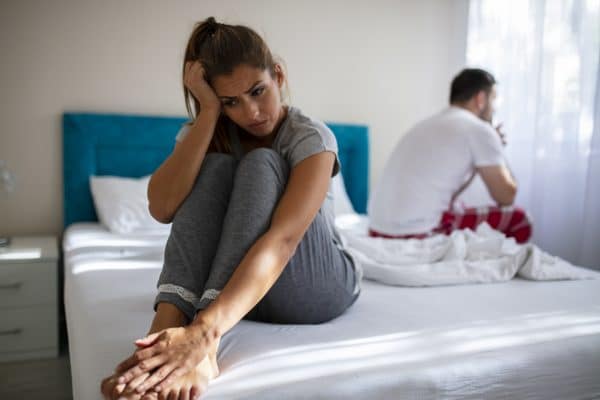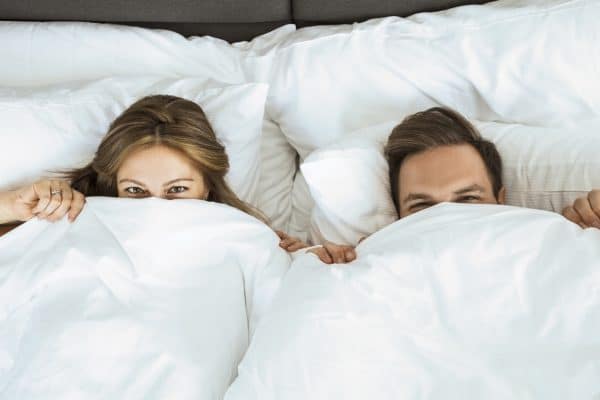His vs. Her:
Sleep Needs Differ Between Men and Women
The Daily Doze
Time and again, research has universally proven sleep is vital to human health. Our bodies and cognitive function require sleep to recharge and recover for the next day -- and for the long term.
As much as sleep is essential to all, there are notable differences in sleep -- between men and women. No one has pinpointed exactly how and why these differences occur. In recent years, research attempts to shed light and broaden the understanding of how sleep affects different gender groups.
Sleep and Needs: His vs. Her
There are several ways genders differ on how they sleep -- or don’t sleep. There are biological, social, and cultural patterns that create a complex picture on how sleep affects men and women in unique ways.

Biological factors, such as hormonal production, circadian rhythms, and sleep cycles, play a major role in how sleep affects men and women. For example, women undergoing menstrual cycles, pregnancy, and menopause can experience significant change in hormone production, and in turn, sleep patterns. These factors evolve over time as the body undergoes biological changes with age.
Research has shown circadian rhythms for women are shorter and have earlier circadian timing versus men -- although the reasons behind this are still unknown.
Societal norms and cultural norms relating to gender roles also play a role in sleep differences. Some cultures place more pressure on men especially with their obligations as primary breadwinners, leading to an increase in stress levels and decreased time in sleep. However in more cultures, the burden is placed more heavily on women -- including work schedules, household obligations, employment, and more.
Sleep Issues and Disorders: His vs. Her
For adults to function optimally, eight hours of sleep a night are recommended regardless of gender. Poor sleep can lead to long-term health consequences such as depression, diabetes, heart complications, among other conditions. Such risks are higher in men and problems are likely to strike men at an earlier age..
For men, increased age also means decreased levels of testosterone -- which is attributed to less sleep and a higher likelihood of developing obstructing sleep apnea, a breathing disorder found to be more common among males.
Men have a higher risk of developing cardiovascular and respiratory problems, both of which affect sleep negatively. Women meanwhile are more likely to be diagnosed with anxiety and depression, mental conditions that contribute to difficulty falling and staying asleep.
On the other hand, women are 40% more likely to develop insomnia. Restless leg syndrome is also observed to be more common in women, particularly during pregnancy.
Women tend to experience more “sleep debt” and workplace accidents from powering through lack of sleep. They seem to fare worse when they lack sleep, and tend to be sleepy and are likely to not perform as optimally the following day. Women are also reported to suffer insomnia two to three times the rate of men.
Sharing Sleep: His & Her
Sleep is often analyzed in terms of individual sleep. In reality, many of us sleep with a partner. Having someone beside you comes with a whole set of new factors and unique problems coming into play.
More people report their sleep is subjectively improved when shared with a partner, regardless of whether the couple is heterosexual or same sex. A feeling of calm and security is released when sleeping next to their partner.
Resolution of issues can occur through cognitive behavioral therapy sessions -- allowing the couple to explore other issues that may have contributed to the poor sleep in the first place, such as depression, anxiety, and marital difficulties.

Resolving Issues: His & Her
More often than not, women are more likely to seek help and go to a physician or therapist to remedy sleep issues. Men are observed to be more reluctant to see a doctor, and usually participate only at their partner’s insistence.
Sleep problems and challenges are best addressed by taking a proactive approach when dealing with sleep to determine the root cause -- not only will you solve your sleep problems sooner, it will also improve your overall health.
Invest in sound sleep solutions to solve your issues. Those suffering from sleep apnea can be addressed by a pillow, while high blood pressure can be addressed by the right sleep surface that does not restrict circulation.
If you have specific symptoms, it is best to speak to a sleep specialist who can guide you in finding the right sleep system that will address your needs.
Want to learn more about sleep? Make sure to check out our other blog posts:
- 5 Random Things You Didn’t Know About Sleep
- Sleep and Performance: Tips from a Pro-Athlete
- 6 Most Burning Questions on Sleep, Answered
Learn more to understand sleep even better. Our Majestic Beds Team is here to help. Feel free to contact us to speak with our Sleep Experts. We can help you find the best solution to your sleep needs.
Sign Up for Exclusives and Updates
Invest in rest. A better sleep means a better life. To get the latest information on sleep science and other interesting info, click below to get notified about new blog updates!
